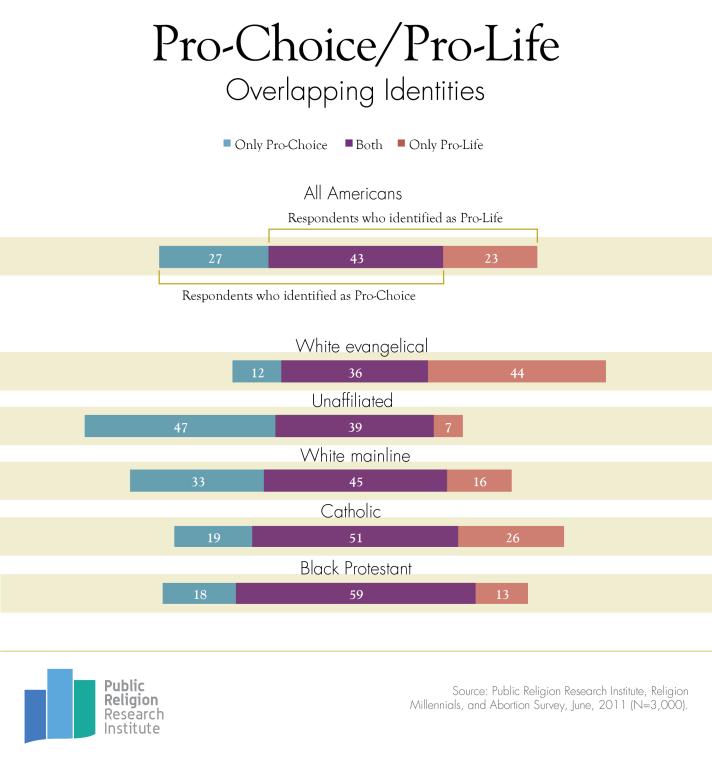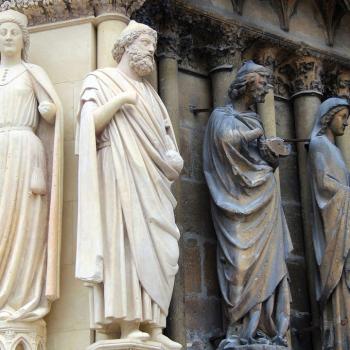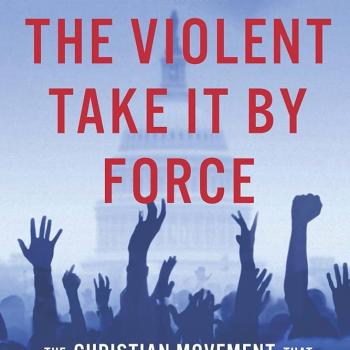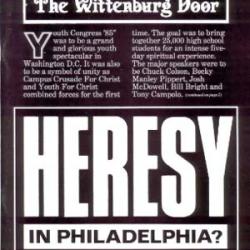This is the Public Religion Research Institute’s Graphic of the Week:
“In an exceedingly complex debate over abortion,” PRRI asks, “what do the labels ‘pro-life’ and ‘pro-choice’ actually mean to average Americans?”
That’s not addressed in this graphic, but their data on “overlapping identities” points toward one possibility.
There’s a lot of purple in that graphic — the portion of each graph representing those who identify as both “pro-choice” and “pro-life.” White evangelicals and Catholics, unsurprisingly have the largest share of adherents who identify exclusively as pro-life. My guess is that this share — those who refuse any association with the identifier pro-choice — reflects those who want to see abortion criminalized, those who view abortion as immoral and also (or therefore) want to see it made illegal.
But more than half of Catholics and more than a third of white evangelicals identify as both pro-life and pro-choice. My guess — and this is only a guess — is that this suggests a moral opposition to abortion along with a perhaps-reluctant acknowledgement that it nonetheless ought to remain a legal option. My guess is that these purple people would be approximately in favor of the old Clinton formula: safe, legal and rare — perhaps with an emphasis on the “rare.” Some might prefer to pursue making abortion more rare by introducing an increasing number of legal hurdles, obstacles and hindrances, but others may prefer to pursue making abortion more rare by empowering women to have a wider menu of viable, meaningful choices (living wages, health care, day care, etc.).
Again, I’m just guessing — the graphic doesn’t actually tell us anything about what the purple people want or what it means, to them, to choose both of those identifiers of pro-life and pro-choice. It may only indicate that many Americans find these identifiers both to be inadequate on their own — as Taja Lindley recently wrote, the polarizing politics of abortion present a stark binary view that doesn’t capture many people’s actual experience:
In today’s binary political system, however, abortion has become oversimplified. Although fraught with social, economic, cultural, and political meaning, abortion has been reduced to a singular and isolated issue in the political arena. And yet, just below the surface of political silencing, those of us whose experiences with abortion do not fit neatly into didactic sound-bites and talking points for pundits and policymakers in their public debates about our bodies, the waters of human experience still run deep.
But if my guess above is correct — if the “pro-life only” category represents those who want to see abortion outlawed, while the purple people lean toward safe, legal and rare — then this graphic shows us something interesting: Earlier surveys have found that about a third of white evangelicals want abortion to be legally available in their communities. Yet this survey finds 48 percent of white evangelicals identifying themselves as pro-choice. This may indicate that allowing respondents to qualify their answers — to say they are pro-choice but also pro-life — resulted in a greater number of white evangelicals being willing to state that they do not wish to see abortion criminalized. And if my guess is correct about what this graphic is showing us, then it would suggest that a greater number of white evangelicals wish to see abortion remain a legal option than wish to see it banned completely.
















